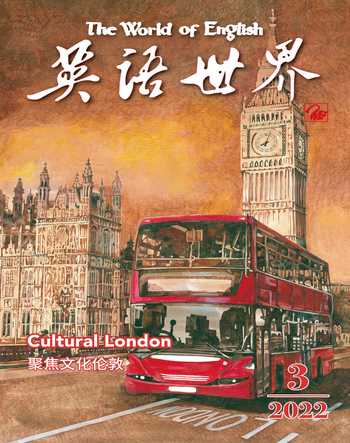Offshore (Excerpt)《離岸》(節(jié)選)
佩內(nèi)洛普·菲茨杰拉德 張菊
【導(dǎo)讀】本文節(jié)選自1979年英國(guó)布克獎(jiǎng)小說(shuō)《離岸》。該部小說(shuō)是英國(guó)女作家佩內(nèi)洛普·菲茨杰拉德(1916—2000)的半自傳體小說(shuō),講述了20世紀(jì)60年代初,女主人公尼娜和兩個(gè)女兒及其他船居者在泰晤士河畔的船居生活。作家以精簡(jiǎn)細(xì)膩的筆觸揭示了船居者所面臨的物質(zhì)、精神、情感等多重困境。本節(jié)選部分主要展示了上世紀(jì)60年代初倫敦國(guó)王路一帶繁華商業(yè)區(qū)的風(fēng)貌。
國(guó)王路是倫敦切爾西地區(qū)一條東西向的路,曾是查理二世的專(zhuān)用道路;1830年,為改善倫敦交通而開(kāi)放給民眾使用。國(guó)王路匯集豪華專(zhuān)賣(mài)店、國(guó)際名牌店及古董店。通過(guò)本節(jié)選內(nèi)容,讀者可跟隨瑪莎和海因里希這對(duì)年輕懵懂的小情侶游覽國(guó)王路,窺一斑而知全豹,領(lǐng)略上世紀(jì)60年代初“搖擺倫敦”的特點(diǎn):浸透著消費(fèi)主義又略帶小資情調(diào)的氛圍。
In this, its heyday, the Kings Road fluttered, like a gypsy encampment, with hastily-dyed finery, while stage folk emerged from their beds at a given hour, to patrol the long pavements between Sloane Square and the Town Hall. Heinrich and Martha went in and out of one boutique after another, Dressing Down, Wearwithal, Wearabouts, Virtuous Heroin, Legs, Rags, Bags. A paradise for children, a riot of misrule, the queer looking shops reversed every fixed idea in the venerable history of commerce. Sellers, dressed in brilliant colours, outshone the purchasers, and, instead of welcoming them, either ignored them or were so rude that they could only have hoped to drive them away. The customers in return sneered at the clothing offered to them, and flung it on the ground. There were no prices, no sizes, no way to tell which stock was which, so that racks and rails of dresses were transferred as though by a magic hand from one shop to another. The doors stood open, breathing out incense and heavy soul, and the spirit was that of the market scene in the pantomime when the cast, encouraged by the audience, has let the business get out of hand.
Heinrich and Martha walked through this world, which was fated to last only a few years before the spell was broken, like a prince and princess. At Wearwithal, Heinrich tried on a pair of pale blue sateen trousers, which fitted tightly. Martha, guarding his jeans while he changed, admired him more for deciding against them than if he had bought them.
“Wont they do?” she asked.
“Such trousers are not worn on the Continent.”
“I thought perhaps you hadnt enough money.”
Heinrich in fact had plenty of money, and his own chequebook, but his delicacy, responding to Marthas pride, prevented him from saying so.
“We will go to a coffee bar.”
These, too, were something new in London, if not in Vienna. The shining Gaggia1 dispensed one-and-a-half inches of bitter froth into an earthenware cup, and for two shillings lovers could sit for many hours in the dark brown shadows, with a bowl of brown sugar between them.
“Perhaps theyll be annoyed if we dont have another cup.”
Heinrich again put his fine, long-fingered hand over hers. She was amazed at its cleanliness. Her own hands were almost as black as Tildas.
“You must not worry. I am in charge. How does that suit you?”
“Im not sure. Ill tell you later,” said Martha, who wished one of her school friends would come in and see her. Theyd tell Father Watson and the nuns, but what did that matter, they must know why she was absent from school anyway.
“I expect, living here in Chelsea, you go out a great deal.”
“How can I? Ive no-one to go out with.”
… He leaned forward and kissed her cheek, which, from being cold when they entered the coffee-bar, was now glowing pink. This was quite the right thing to do in a coffee-bar in the Kings road. But afterwards they became, for the time being, rather more distant.
“It has been very pleasant to spend the day here, Martha, and to see your boat.”
“Yes, well, at least thats something you havent got in Vienna.”
Heinrichs father was a member of the Wiener Yacht Club.
“Certainly, not such a large one.”
Outside the boutiques were still aglow with heaps of motley flung about the feet of the disdainful assistants. The music grew louder, the Chelsea Granada welcomed all who would like to come in and watch the transmission of Bootsie and Snudge2. They wandered on together at random.
“Two people can become close in a very short time,” Heinrich said. “It is up to them not to let circumstances get the better of them. It is my intention, as I think I told you, to shape my own life.”
【英文出自:Penelope Fitzgerald, Offshore, London: Fourth Estate, 2009: 147-152。感謝原作版權(quán)代理人特倫斯·杜利先生(Mr. Terence Dooley)授權(quán)刊發(fā)。】
此時(shí)正是國(guó)王路一天中最熱鬧的時(shí)候,不斷有人涌入,就像吉卜賽人的營(yíng)地,各種服飾色彩奔放。斯隆廣場(chǎng)和市政廳之間長(zhǎng)長(zhǎng)的人行道上,人群熙熙攘攘,人們就像在某個(gè)特定時(shí)間醒來(lái)登場(chǎng)的舞臺(tái)演員。海因里希和瑪莎樂(lè)此不疲地逛著一家家精品店:酷裝、維爾唯我、維爾寶姿、美德女裝、褲裝店、布料店和手袋店。這里真是孩子的樂(lè)園,一片混亂之中,看起來(lái)奇奇怪怪的店鋪顛覆了古老商業(yè)史上的每一個(gè)陳見(jiàn)。售貨員衣著光鮮,比顧客穿得還好,而且顧客并不受待見(jiàn),售貨員要么對(duì)他們視而不見(jiàn),要么粗魯?shù)胶薏坏弥苯影杨櫩挖s走。顧客則對(duì)提供的試裝服報(bào)以譏諷,把衣服扔在地上。衣服上沒(méi)有價(jià)簽,沒(méi)有型號(hào)大小,也沒(méi)法說(shuō)哪件衣服是哪堆貨里的,衣服和衣架像是被一只神奇的手從一家店轉(zhuǎn)到另一家店。門(mén)都敞開(kāi)著,向外飄出熏香和深沉的靈樂(lè),那店鋪就像啞劇里的市場(chǎng),受到觀眾慫恿的演員演著演著就完全失控了。
海因里希和瑪莎仿如王子和公主穿行在這個(gè)世界——然而只要再過(guò)幾年,魔咒就會(huì)被解除。在維爾唯我,海因里希試穿了一條淡藍(lán)色棉緞褲,緊緊地貼身繃著。瑪莎在他試衣時(shí)看著他脫下的牛仔褲,他決定不買(mǎi)后,她因此而更敬佩他。
“是不合適嗎?”她問(wèn)。
“歐洲大陸不穿這種風(fēng)格的褲子。”
“我以為你錢(qián)不夠呢。”
事實(shí)是海因里希很有錢(qián),他還有自己的支票簿,但他很細(xì)心,很照顧瑪莎的自尊心,沒(méi)把實(shí)情托出。
“我們?nèi)タХ劝勺鴷?huì)兒。”
雖然咖啡吧在維也納已不算新事物,但在倫敦還是。閃閃發(fā)光的加吉亞咖啡機(jī)把一英寸半的苦沫倒進(jìn)陶制杯子,情侶們花兩先令就可以在深棕色調(diào)的環(huán)境里坐上好幾個(gè)小時(shí),桌上還放著一碗紅糖。
“要是我們不再點(diǎn)一杯,他們也許會(huì)生氣。”
海因里希把手又放在了她的手上,他的手指細(xì)長(zhǎng)秀氣。她驚嘆這只手如此干凈——她自己的手幾乎跟蒂爾達(dá)的一樣黑。
“別擔(dān)心,我付賬。你覺(jué)得怎么樣?”
“我不確定,過(guò)會(huì)兒告訴你。”瑪莎說(shuō)。她真希望她的同學(xué)能進(jìn)來(lái)看到她。她們就會(huì)把看到的報(bào)告給沃森神父和修女,但那有什么關(guān)系呢,得讓他們明白她到底為什么逃學(xué)了。
“我猜,你們既然住在切爾西,一定經(jīng)常出門(mén)。”
“怎么會(huì)呢?沒(méi)人陪我。”
……他俯身向前親了親她的臉,剛進(jìn)咖啡吧時(shí),她的臉涼涼的,現(xiàn)在白里透紅。在國(guó)王路的咖啡館,這正是應(yīng)該做的事情。但之后,他們暫時(shí)又變得疏遠(yuǎn)了。
“瑪莎,我在這兒待了一天,還看了你們的船,很愉快。”
“那好啊,嗯,起碼在維也納你們沒(méi)有這樣的船。”
海因里希的父親是維也納游艇俱樂(lè)部成員。
“是,沒(méi)這么大的船。”
精品店外依舊燈火通明,倨傲的店員腳邊扔著一堆堆亂七八糟的東西。音樂(lè)聲越來(lái)越大,切爾西格拉納達(dá)歡迎任何一個(gè)想進(jìn)店看《布西和斯威齊》轉(zhuǎn)播的人。他倆漫無(wú)目的地逛著。
“兩個(gè)人可以在很短時(shí)間內(nèi)變得很親密,”海因里希說(shuō),“受不受外界干擾要看他們自己。我想我告訴過(guò)你,我的目標(biāo)就是塑造我自己的生活。”
【中文出自:《離岸》,佩內(nèi)洛普·菲茨杰拉德著,張菊譯,中信出版社,2020。感謝中信出版社授權(quán)刊發(fā)。】
(譯者單位:北京化工大學(xué))
1加吉亞,意大利歷史悠久的咖啡機(jī)品牌。產(chǎn)品包括家用全自動(dòng)、半自動(dòng)意式咖啡機(jī),商用全自動(dòng)、半自動(dòng)大型咖啡機(jī)等,由意大利人加吉亞發(fā)明。
2《布西和斯威齊》,英國(guó)情景喜劇,1960至1963年在ITV上播出了三季;1974年播出了第四季。該節(jié)目是《陸軍游戲》的衍生作品,講述了前中士克勞德·斯威齊少校和布西下士退役后的生活。

